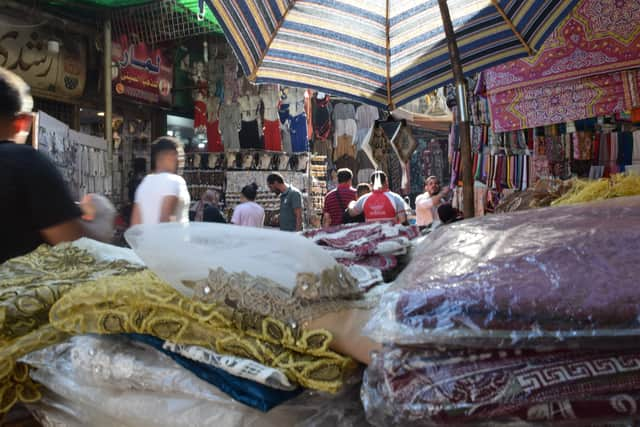Travelling with disabilities: I have to plan for everything, and yet still manage to find the spontaneous


Suswati is the Head of Audience at NationalWorld. She has a rare degenerative condition, Hereditary Neuropathy with Liability to Pressure Palsies. A sister condition to Multiple Sclerosis and Charcot Marie Tooth Disorder, it's a demyelination of nerves which stops the signals going from the brain to other parts of her body. As a result, it can cause paralysis, tremors and further complications. She requires a walking aid or wheelchair to help her move around. Her arms are in splints. An avid traveller, we asked her to talk about her experiences abroad with these physical setbacks.
It would be naïve to say that travelling abroad with a mobility issue is a wheelchair roll in the park. From the steep kerbed pavements of Europe, 'romantic' cobblestone streets, ‘accessible’ venues that always have a step that personnel never seem to notice, to the people who believe carrying you up and down stairs on your mobility aid is acceptable when it robs you of both dignity and autonomy: there are myriad hidden obstacles to take in consideration. We’re still far behind when it comes to assisting those who are disabled when they travel.


Advertisement
Hide AdAdvertisement
Hide AdHowever, it doesn’t mean never say never. As a solo female adventurer, going abroad alone already meant planning and preparation, finding ways to ensure my safety while at the same time finding ways to enjoy myself as much as possible. The same can be said for travelling with a disability, but you have to add a few extra preparatory columns on your spreadsheet.
Here is some hard-won advice on preparing to travel with a disability (or how you can assist a loved one if you want to travel with someone with specific needs) - and why it's worth the extra work.
Travelling with a disability: insurance matters, and it will cost you
Travel insurance is a wise precaution for any traveller: for the disabled, it is an absolute-must. It may feel like you’re giving away money, but believe me, when you have a setback in your health condition, you’d be thanking your lucky stars. That happened to me when I first attempted to visit Tunisia in 2018. I had to abandon a long-planned holiday. I was able to claim back the entire cost of my trip, but it meant being meticulous in my receipt and documentation-keeping, and getting proof from health professionals. However, this does not come cheap.
Suswati BasuThere are just some things that cannot be organised, but instead taken in your stride.
It's can be more expensive to travel with a disability, and this starts with the insurance. The more things the policy covers, the more expensive it is. The cost is higher to cover certain health conditions, particularly if you’ve had to access hospital treatment or had any relapses in the past two years. According to the disability charity Scope, it is against the law for a company to refuse to insure you or offer worse terms because you’re disabled. They add “they can charge you more or apply special conditions if they believe you’re at a higher risk of making a claim.” For this reason, it’s vital to shop around and find travel insurance that specialises in pre-existing conditions. It’s worth checking with your bank if they include this if you already have insurance with them. Unfortunately, much of the time, this is not part of the deal.
Advertisement
Hide AdAdvertisement
Hide AdA quick test on a comparison site can show the stark difference between the costs. Using a simple test for a single traveller with and without a pre-existing condition going on a trip to France has a £39 increase. As someone who lives with three medical diagnoses, you can see how costs can start to add up. So when planning a trip, it’s essential to factor this into the budget from the get go.
While disabled travellers deserve and should expect the same level of service as any customer, there are travel companies that specialise in helping those with specific requirements
- Enable Holidays is an award-winning travel company that specialises in accessible travel for wheelchair users
- Limitless plans holidays for people with a wide range of mobility restrictions and conditions.
- Travel Eyes offers independent group travel for people who are blind or partially sighted
- Disabled Holidays organises a range of accessible holidays including cruises, adventure holidays, and family breaks
- Scope provides travel advice and important links for disabled travellers.
Negotiating airport and train stations: prepare ahead of time


The complications of travelling abroad start long before you even roll onto foreign soil. Travelling to and from destinations, for example from your home to the airport or train station, requires careful consideration. When my legs are functional, I have a wheelie suitcase that also turns into a backpack to give me the option of changing how to hold it depending on what physical state my condition has left me in or how accessible a station is. Trying to then manoeuvre this bag with a walking stick on an escalator is another question. This is where asking for help is necessary. Don’t be afraid to stick your neck out (pun intended) and call out for staff to accompany you to where you need to go.
Booking assistance at the airport or station beforehand is non-negotiable. There have been plenty of times where I have witnessed people turn up, expecting to arrange this at the terminal, and have been turned away. And it’s not straightforward. Ryanair, for example, has various options you have to decipher to get the right type of assistance. The best thing is to talk to the airline online or on the phone to sort this out as you book your flights.
Similarly, I have had to check beforehand whether any medication brought into the country is actually authorised. Egypt, for instance, is incredibly strict with what you can bring in, and it requires speaking with embassy officials to avoid any drama. You will need a prescription list and a doctor’s note confirming your health condition. Laura Plummer found herself in that nightmare situation in 2019 when she was jailed for mistakenly bringing in controlled painkillers. It took 13 months to broker her release. Again: prepare ahead. Check the foreign travel advice on gov.uk to see what the regulations are for the country you are travelling to.
If something goes wrong with your wheelchair, report it immediately
Advertisement
Hide AdAdvertisement
Hide AdThere have been plenty of horror stories when it comes to wheelchairs being damaged in transit, which is where the travel insurance will come in handy. Wheelchair Travel, which is a designated site to help navigate the system with a mobility aid, says all airlines are 100% liable to pay for any broken parts. They recommend reporting any damages immediately to the airline’s baggage office otherwise they could avoid liability. They’re also expected to accommodate you with a loaner chair for as long as the repairs take.
Prepare all you can - but be adaptable
Tired of hearing me say how important it is to arrange things in advance? It is, unfortunately, a dampener on spontaneity, but that is the sacrifice disabled travellers are having to make until accessibility improves globally. And of course, even the best laid plans can come a cropper.


Just in the past month, I travelled to Brussels via Eurostar, who provide £39 seats one way all-year-round for wheelchair users in first class, a discounted companion ticket, and access to the business lounge - an absolute dream, I thought. But lo and behold, arriving at the main station means you need to get a taxi that will accommodate your wheelchair as trains to the centre of the city have a steep step, which you just cannot hop on with a 50kg contraption. Then arriving at the ‘accessible’ hotel, there was a step in front of the wheelchair entrance. While you may be planning ahead, prepare yourself for a different kind of spontaneity. There are just some things that cannot be organised, but instead taken in your stride.
You can still find the fun in travelling


Why do I then undertake the inconvenience, extra expense, and frankly the stress caused by travelling with my physical condition? I won't be deterred by a world that isn't sufficiently accommodating to me and the millions of people with similar concerns. And when I have put the extra effort in to account for the things that are not provided for me, I find remarkable rewards - and that measure of spontaneity you may have thought was unobtainable.
Advertisement
Hide AdAdvertisement
Hide AdSuch as in Iceland, when I impulsively hobbled around in -10C by myself and randomly entered an accessible store that doubled up as a chocolate factory. The fresh air of the capital Reykjavik was gratifying and the Blue Lagoon thermal baths were primal, untensing muscles that had long been contracted. None of this was pre-arranged.


Not to mention speaking to wonderful guests at the hotel I stayed at and ‘jumping’ on a bus to watch the Northern Lights in the middle of the night - just remembering the magic that is the world around us. It is far from all doom and gloom, it is just a different way of travelling! Factoring in things like rest, avoiding certain venues that have stairs, calling up places beforehand - I do it, because, ultimately, soaking up the sights and sounds of another culture makes it all worth it in the end.
Comment Guidelines
National World encourages reader discussion on our stories. User feedback, insights and back-and-forth exchanges add a rich layer of context to reporting. Please review our Community Guidelines before commenting.
